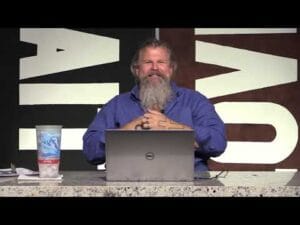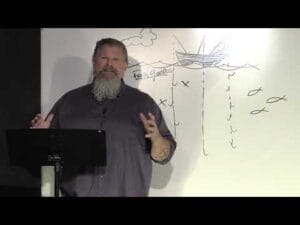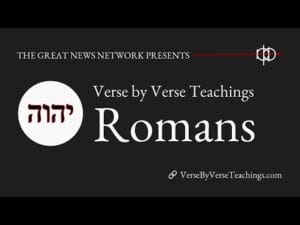
The Law of the Land vs. The Law of God
Shawn distinguishes between following secular and divine laws, urging Christians to respect government laws unless they conflict with Christian principles, like proclaiming Christ's kingdom.

Shawn distinguishes between following secular and divine laws, urging Christians to respect government laws unless they conflict with Christian principles, like proclaiming Christ's kingdom.

Script currently unavailable.

God grants free will and humility fosters divine connection; pride obstructs spiritual growth. Humility enables guidance, while pride leads to isolation from God.

Paul uses Isaac and Ishmael to show true children of God are born of the Spirit. God's choices, like Jacob over Esau, highlight His purposes, not human merit.

Shawn leads a discussion on Noah's flood, suggesting it was regional, supported by science and biblical hyperbole. He encourages balancing faith with logic and open dialogue.

Shawn examines Romans 3:22, debating if righteousness is by faith in Jesus or Jesus' own faith. He analyzes translations, urging personal interpretation with love and faith.

Evaluate faith orientation by identifying personal biases like seeking experiences or community. True growth is challenging biases to love universally in Jesus' name.

Script currently unavailable.

Christian wealth isn't contradictory; it's about perspective, acquisition, and use. Prioritize God, manage wealth wisely, avoid corruption, and maintain spiritual focus.

Script currently unavailable.

Shawn uses 1960s imagery to teach that faith and love, guided by liberty and humility, lead to hope and harmony, while rigid doctrine leads to fear and unrest.

Paul's sorrow for Israelites, distinction between flesh and Spirit, emphasis on freewill in salvation, Israel's unique privileges, divine election, and spiritual adoption.

Terminal illness in children raises questions of divine love, free will, and suffering. Religion offers eternal perspective and comfort, contrasting atheism's transient view.

Shawn envisions the afterlife as engaging in God-like activities, extending love, light, and life, akin to Jesus' mission, with earthly virtues preparing for divine service.

Shawn teaches universal access to heaven through Jesus, with faith affecting rewards. God's love is unconditional, urging followers to love all as joint heirs with Christ.

Romans 9 discusses God's control vs. human response, using Abraham's faith journey. It contrasts Ishmael and Isaac, Esau and Jacob, emphasizing faith, divine timing, and God's promises over human efforts.

Shawn discusses modern-day revelation, faith-science coexistence, belief in Christ, heart transformation, God's existence through design, and the universe's mysteries.

Shawn urges embracing love and acceptance over doctrinal disputes, focusing on unity and understanding others' beliefs, prioritizing love for God and neighbors.

Shawn invites all but assassins to a baptism event, focusing on personal faith over doctrine. Encourages genuine seekers of Christ's love to stay engaged, offering a fresh take on 1 Corinthians 13.

Romans 8 highlights God's role in salvation, emphasizing His mercy and grace, ensuring believers' eternal security and victory over adversities through faith in Christ.